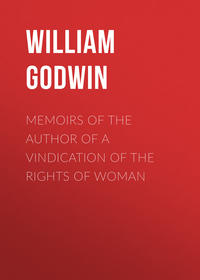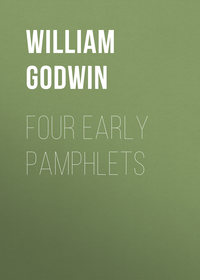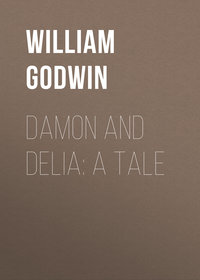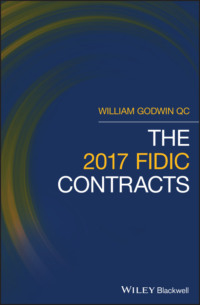 полная версия
полная версияCaleb Williams; Or, Things as They Are
"Why cannot I recall the last four days of my life? How was it possible for me to be so eager, so obstinate, in a purpose so diabolical? Oh, that I had listened to the expostulations of the magistrate that hears me, or submitted to the well-meant despotism of his authority! Hitherto I have been only miserable; henceforth I shall account myself base! Hitherto, though hardly treated by mankind, I stood acquitted at the bar of my own conscience. I had not filled up the measure of my wretchedness!
"Would to God it were possible for me to retire from this scene without uttering another word! I would brave the consequences—I would submit to any imputation of cowardice, falsehood, and profligacy, rather than add to the weight of misfortune with which Mr. Falkland is overwhelmed. But the situation, and the demands of Mr. Falkland himself, forbid me. He, in compassion for whose fallen state I would willingly forget every interest of my own, would compel me to accuse, that he might enter upon his justification. I will confess every sentiment of my heart.
"No penitence, no anguish, can expiate the folly and the cruelty of this last act I have perpetrated. But Mr. Falkland well knows—I affirm it in his presence—how unwillingly I have proceeded to this extremity. I have reverenced him; he was worthy of reverence: I have loved him; he was endowed with qualities that partook of divine.
"From the first moment I saw him, I conceived the most ardent admiration. He condescended to encourage me; I attached myself to him with the fulness of my affection. He was unhappy; I exerted myself with youthful curiosity to discover the secret of his woe. This was the beginning of misfortune.
"What shall I say?—He was indeed the murderer of Tyrrel; he suffered the Hawkinses to be executed, knowing that they were innocent, and that he alone was guilty. After successive surmises, after various indiscretions on my part, and indications on his, he at length confided to me at full the fatal tale!
"Mr. Falkland! I most solemnly conjure you to recollect yourself! Did I ever prove myself unworthy of your confidence? The secret was a most painful burthen to me; it was the extremest folly that led me unthinkingly to gain possession of it; but I would have died a thousand deaths rather than betray it. It was the jealousy of your own thoughts, and the weight that hung upon your mind, that led you to watch my motions, and to conceive alarm from every particle of my conduct.
"You began in confidence; why did you not continue in confidence? The evil that resulted from my original imprudence would then have been comparatively little. You threatened me: did I then betray you? A word from my lips at that time would have freed me from your threats for ever. I bore them for a considerable period, and at last quitted your service, and threw myself a fugitive upon the world, in silence. Why did you not suffer me to depart? You brought me back by stratagem and violence, and wantonly accused me of an enormous felony! Did I then mention a syllable of the murder, the secret of which was in my possession?
"Where is the man that has suffered more from the injustice of society than I have done? I was accused of a villainy that my heart abhorred. I was sent to jail. I will not enumerate the horrors of my prison, the lightest of which would make the heart of humanity shudder. I looked forward to the gallows! Young, ambitious, fond of life, innocent as the child unborn, I looked forward to the gallows! I believed that one word of resolute accusation against my patron would deliver me; yet I was silent, I armed myself with patience, uncertain whether it were better to accuse or to die. Did this show me a man unworthy to be trusted?
"I determined to break out of prison. With infinite difficulty, and repeated miscarriages, I at length effected my purpose. Instantly a proclamation, with a hundred guineas reward, was issued for apprehending me. I was obliged to take shelter among the refuse of mankind, in the midst of a gang of thieves. I encountered the most imminent peril of my life when I entered this retreat, and when I quitted it. Immediately after, I travelled almost the whole length of the kingdom, in poverty and distress, in hourly danger of being retaken and manacled like a felon. I would have fled my country; I was prevented. I had recourse to various disguises; I was innocent, and yet was compelled to as many arts and subterfuges as could have been entailed on the worst of villains. In London I was as much harassed and as repeatedly alarmed as I had been in my flight through the country. Did all these persecutions persuade me to put an end to my silence? No: I suffered them with patience and submission; I did not make one attempt to retort them upon their author.
"I fell at last into the hands of the miscreants that are nourished with human blood. In this terrible situation I, for the first time, attempted, by turning informer, to throw the weight from myself. Happily for me, the London magistrate listened to my tale with insolent contempt.
"I soon, and long, repented of my rashness, and rejoiced in my miscarriage.
"I acknowledge that, in various ways, Mr. Falkland showed humanity towards me during this period. He would have prevented my going to prison at first; he contributed towards my subsistence during my detention; he had no share in the pursuit that had been set on foot against me; he at length procured my discharge, when brought forward for trial. But a great part of his forbearance was unknown to me; I supposed him to be my unrelenting pursuer. I could not forget that, whoever heaped calamities on me in the sequel, they all originated in his forged accusation.
"The prosecution against me for felony was now at an end. Why were not my sufferings permitted to terminate then, and I allowed to hide my weary head in some obscure yet tranquil retreat? Had I not sufficiently proved my constancy and fidelity? Would not a compromise in this situation have been most wise and most secure? But the restless and jealous anxiety of Mr. Falkland would not permit him to repose the least atom of confidence. The only compromise that he proposed was that, with my own hand, I should sign myself a villain. I refused this proposal, and have ever since been driven from place to place, deprived of peace, of honest fame, even of bread. For a long time I persisted in the resolution that no emergency should convert me into the assailant. In an evil hour I at last listened to my resentment and impatience, and the hateful mistake into which I fell has produced the present scene.
"I now see that mistake in all its enormity. I am sure that if I had opened my heart to Mr. Falkland, if I had told to him privately the tale that I have now been telling, he could not have resisted my reasonable demand. After all his precautions, he must ultimately have depended upon my forbearance. Could he be sure that, if I were at last worked up to disclose every thing I knew, and to enforce it with all the energy I could exert, I should obtain no credit? If he must in every case be at my mercy, in which mode ought he to have sought his safety, in conciliation, or in inexorable cruelty?
"Mr. Falkland is of a noble nature. Yes; in spite of the catastrophe of Tyrrel, of the miserable end of the Hawkinses, and of all that I have myself suffered, I affirm that he has qualities of the most admirable kind. It is therefore impossible that he could have resisted a frank and fervent expostulation, the frankness and the fervour in which the whole soul is poured out. I despaired, while it was yet time to have made the just experiment; but my despair was criminal, was treason against the sovereignty of truth.
"I have told a plain and unadulterated tale. I came hither to curse, but I remain to bless. I came to accuse, but am compelled to applaud. I proclaim to all the world, that Mr. Falkland is a man worthy of affection and kindness, and that I am myself the basest and most odious of mankind! Never will I forgive myself the iniquity of this day. The memory will always haunt me, and embitter every hour of my existence. In thus acting I have been a murderer—a cool, deliberate, unfeeling murderer.—I have said what my accursed precipitation has obliged me to say. Do with me as you please! I ask no favour. Death would be a kindness, compared to what I feel!"
Such were the accents dictated by my remorse. I poured them out with uncontrollable impetuosity; for my heart was pierced, and I was compelled to give vent to its anguish. Every one that heard me, was petrified with astonishment. Every one that heard me, was melted into tears. They could not resist the ardour with which I praised the great qualities of Falkland; they manifested their sympathy in the tokens of my penitence.
How shall I describe the feelings of this unfortunate man? Before I began, he seemed sunk and debilitated, incapable of any strenuous impression. When I mentioned the murder, I could perceive in him an involuntary shuddering, though it was counteracted partly by the feebleness of his frame, and partly by the energy of his mind. This was an allegation he expected, and he had endeavoured to prepare himself for it. But there was much of what I said, of which he had had no previous conception. When I expressed the anguish of my mind, he seemed at first startled and alarmed, lest this should be a new expedient to gain credit to my tale. His indignation against me was great for having retained all my resentment towards him, thus, as it might be, to the last hour of his existence. It was increased when he discovered me, as he supposed, using a pretence of liberality and sentiment to give new edge to my hostility. But as I went on he could no longer resist. He saw my sincerity; he was penetrated with my grief and compunction. He rose from his seat, supported by the attendants, and—to my infinite astonishment—threw himself into my arms!
"Williams," said he, "you have conquered! I see too late the greatness and elevation of your mind. I confess that it is to my fault and not yours, that it is to the excess of jealousy that was ever burning in my bosom, that I owe my ruin. I could have resisted any plan of malicious accusation you might have brought against me. But I see that the artless and manly story you have told, has carried conviction to every hearer. All my prospects are concluded. All that I most ardently desired, is for ever frustrated. I have spent a life of the basest cruelty, to cover one act of momentary vice, and to protect myself against the prejudices of my species. I stand now completely detected. My name will be consecrated to infamy, while your heroism, your patience, and your virtues will be for ever admired. You have inflicted on me the most fatal of all mischiefs; but I bless the hand that wounds me. And now,"—turning to the magistrate—"and now, do with me as you please. I am prepared to suffer all the vengeance of the law. You cannot inflict on me more than I deserve. You cannot hate me, more than I hate myself. I am the most execrable of all villains. I have for many years (I know not how long) dragged on a miserable existence in insupportable pain. I am at last, in recompense for all my labours and my crimes, dismissed from it with the disappointment of my only remaining hope, the destruction of that for the sake of which alone I consented to exist. It was worthy of such a life, that it should continue just long enough to witness this final overthrow. If however you wish to punish me, you must be speedy in your justice; for, as reputation was the blood that warmed my heart, so I feel that death and infamy must seize me together."
I record the praises bestowed on me by Falkland, not because I deserved them, but because they serve to aggravate the baseness of my cruelty. He survived this dreadful scene but three days. I have been his murderer. It was fit that he should praise my patience, who has fallen a victim, life and fame, to my precipitation! It would have been merciful in comparison, if I had planted a dagger in his heart. He would have thanked me for my kindness. But, atrocious, execrable wretch that I have been! I wantonly inflicted on him an anguish a thousand times worse than death. Meanwhile I endure the penalty of my crime. His figure is ever in imagination before me. Waking or sleeping, I still behold him. He seems mildly to expostulate with me for my unfeeling behaviour. I live the devoted victim of conscious reproach. Alas! I am the same Caleb Williams that, so short a time ago, boasted that, however great were the calamities I endured, I was still innocent.
Such has been the result of a project I formed, for delivering myself from the evil that had so long attended me. I thought that, if Falkland were dead, I should return once again to all that makes life worth possessing. I thought that, if the guilt of Falkland were established, fortune and the world would smile upon my efforts. Both these events are accomplished; and it is now only that I am truly miserable.
Why should my reflections perpetually centre upon myself?—self, an overweening regard to which has been the source of my errors! Falkland, I will think only of thee, and from that thought will draw ever-fresh nourishment for my sorrows! One generous, one disinterested tear I will consecrate to thy ashes! A nobler spirit lived not among the sons of men. Thy intellectual powers were truly sublime, and thy bosom burned with a god-like ambition. But of what use are talents and sentiments in the corrupt wilderness of human society? It is a rank and rotten soil, from which every finer shrub draws poison as it grows. All that, in a happier field and a purer air, would expand into virtue and germinate into usefulness, is thus concerted into henbane and deadly nightshade.
Falkland! thou enteredst upon thy career with the purest and most laudable intentions. But thou imbibedst the poison of chivalry with thy earliest youth; and the base and low-minded envy that met thee on thy return to thy native seats, operated with this poison to hurry thee into madness. Soon, too soon, by this fatal coincidence, were the blooming hopes of thy youth blasted for ever. From that moment thou only continuedst to live to the phantom of departed honour. From that moment thy benevolence was, in a great part, turned into rankling jealousy and inexorable precaution. Year after year didst thou spend in this miserable project of imposture; and only at last continuedst to live, long enough to see, by my misjudging and abhorred intervention, thy closing hope disappointed, and thy death accompanied with the foulest disgrace!
I began these memoirs with the idea of vindicating my character. I have now no character that I wish to vindicate: but I will finish them that thy story may be fully understood; and that, if those errors of thy life be known which thou so ardently desiredst to conceal, the world may at least not hear and repeat a half-told and mangled tale.
THE END1
I confess, however, the inability I found to weave a catastrophe, such as I desired, out of these ordinary incidents. What I have here said, therefore, must not be interpreted as applicable to the concluding sheets of my work.
2
An incident exactly similar to this was witnessed by a friend of the author, a few years since, in a visit to the prison of Newgate.
3
A story extremely similar to this is to be found in the Newgate Calendar, vol. i. p. 382.
4
See Howard on Prisons.
5
In the case of the peine forte et dure. See State Trials, Vol. I. anno 1615.
6
This seems to be the parody of a celebrated saying of John King of France, who was taken prisoner by the Black Prince at the battle of Poitiers.
7
Eugene Aram. See Annual Register for 1759.
8
William Andrew Home. Ibid.









